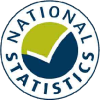How many qualifiers from HE are there?
The total number of qualifications achieved in 2017/18 was 777,005. This was an increase of 3% in the number of qualifications achieved in comparison to 2016/17, largely attributed to the increase at masters taught level. This follows the increase in Non-EU students studying in the UK. The number of first degree qualifications awarded also increased, but there were fewer other undergraduate qualifications awarded. In the context of the European Union, tertiary education statistics published by Eurostat in December 2018 reported the UK to have the second largest number of qualifiers in 2016, behind France.
Of those gaining a classified first degree:
- The percentage of students achieving a first class honours has increased two percentage points every year since 2013/14.
- A larger proportion of female students gained a first or upper second class honours than male students.
- A larger proportion of full-time students gained a first or upper second class honours than part-time students.
There were 21,960 students who qualified with an unclassified first degree in 2017/18. This mainly includes degrees that don't have a classification, such as medicine. These students are excluded from Figure 17 but included in the total number of first degree qualifiers in Figure 16.
Figure 18 shows that in 2017/18:
- More qualifications were awarded in business & administrative studies than any other subject area.
- Amongst part-time students, more qualifications were awarded in subjects allied to medicine than any other subject area.
Over the five year period 2013/14 - 2017/18:
- There has been a decline in the number of qualifications gained in languages and education.
- There has been an overall increase in the number of qualifications gained in biological sciences.





